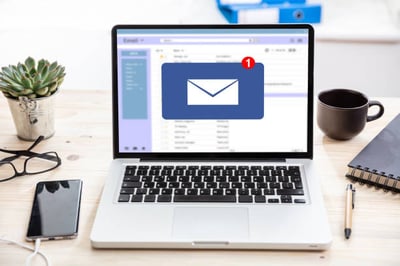August 1, 2025
.png?width=400&height=150&name=Copy%20of%20G2%20Image%20(1).png) by Shreya Mattoo / August 1, 2025
by Shreya Mattoo / August 1, 2025

The hardest part of a business letter isn’t knowing what it is; it’s writing one that feels polished, professional, and ready to send. A poorly structured resignation, cover note, or client update can weaken your message; a well-formatted letter can earn trust, speed up decisions, and strengthen relationships.
This guide walks you through writing a business letter step by step, with templates you can adapt to different scenarios. You’ll also see how tools like document creation software streamline formatting, maintain consistency, and save time so you can focus on your message rather than margins.
In an age of instant messaging and Slack pings, business letters maintain their value for a reason. They provide a formal, dated record of intent or action, signal respect and seriousness, and minimize misinterpretation.
Every business letter should follow a clear structure and professional tone. Use this step-by-step checklist along with the sample template below to ensure your letters are polished, accurate, and effective. You can keep this as an interactive checklist or download a printable version for quick reference.
This combined approach gives readers both a repeatable process and a ready-to-use letter template, making it easier to draft professional letters with confidence. Below is the finished version of the business letter we just created.
Subject: Oncoming content projects for FY25-26
Introduction: Facilitate the senior member or peer with a proper greeting
Paragraph 1: Introduce the main subject of the letter, which is "content projects and audit." List all the projects you wish to discuss, involved people, timelines, resources, and other factual details.
Paragraph 2: Elaborate more on the subject. If you are discussing content projects, mention the progress till now, new ideas, concepts, and early completion strategy. Shed light on your strengths, challenges, and newer ways to expedite work.
Closing paragraph: Finally, end on a positive note with an affirmation to hit the targets soon; also, keep an open door for cross-questioning.
I hope you found the brief to your liking. If there are any questions, please feel free to contact me.
Business letters are split up according to their purpose. Not every piece of communication aims to send the same message. Some letters end your time at a company; others get you noticed by a new hiring manager. Some are a summation of your tenure as an employee; others are surveys to gauge your satisfaction with your current workspace.
Below is the list of different business letters to establish formal correspondence and professional communication.
Send an email to a recruiter when you want to proactively highlight your skills or request reconsideration for a role you’ve applied for. This can help you stand out in competitive job markets.
When you send an email to recruiter, keep your attention on these three aspects:
Dear [Mr. or Mrs.] [Recruiter name],
Subject: Appeal for re-evaluation of the candidature for [position name]
I am writing this email to you in the interest of my current job application status for the position of [Position Name] in your esteemed organization. As the application has been withdrawn by the company, I am putting my appeal for re-evaluation of the same.
I have completed my Bachelor's in International Marketing from [Institute Name] with a GPA of 7.5 (all-rounder). Right after graduation, I interned at [Previous Company] as a [Position Name] for eight months. During my internship, I was trained extensively on [hard skill 1], [hard skill 2], and [hard skill 3]. I also attended workshops on business communication that honed my [soft skill 1] and [soft skill 2].
To summarize my concern, I request that you reconsider my application or state a detailed reason for rejection. I truly believe my professional experience and academic expertise can be a perfect fit for this responsibility. Hoping for a revert!
Best,
[Your name]
A cover letter is a letter that you send to a company when you wish to be considered for a job opportunity. Attach a cover letter to your job application to expand on your resume, showcase your personality, and connect your skills directly to the role.
When you draft a cover letter, keep your attention on these three aspects:
Dear [Mr. or Mrs.] [Recruiter name],
Subject: Cover letter for the position of [position name] at [organization name]
I am submitting this cover letter and my resume for the position of [position name] at your esteemed organization. I wish to take this moment and highlight my soft skills.
From my college days, I have always been a front-desk student. I meticulously copied notes, kept my eyes bent upon my books and notebooks, and spared time to play basketball. I identified myself as a problem solver, someone with the knack of being consistent with her work.
Soon after graduation, I was interviewed by several companies for several positions. I was appointed as [position name] at [company name]. At that point, I was dedicated to gaining professional thrust. Although the initial days were hard, I slowly adapted to diverse business scenarios. I received appreciation for my communication, problem-solving, analytical, and email skills.
As I stand on the verge of a new role, I cannot contain my excitement for all the amazing ventures. I would focus on my goals and help the company scale new pillars of growth and excellence.
Best,
[Your name]
You should write a cover letter whenever you are trying to get hired for a job in the corporate world.
Many job applications will say a cover letter is optional. However, I encourage you to write one anyway.
A thank you letter is a token of appreciation towards the recipient for any help or time they provided to you. After an interview, promotion, or significant help from a colleague or manager, send a thank-you letter to reinforce relationships and express appreciation.
When you create a thank you letter, keep these pointers in mind.
Respected [Mr.] or [Mrs.] [Manager Name]
Subject: Expressing my sincere thanks for promoting me to [new position]
I wish to express my sincere gratitude to you for promoting me to the coveted role of [new position name]. This news came as a surprise today and left me in a state of amazement. For every employee, there is no bigger gift than being understood, valued, and appreciated for their work. I wish to give you sheer credit for believing in me, mentoring me, and encouraging me to take that leap of faith.
As I gear up for the new position of [Position Name], I promise to uphold the virtues of integrity, team effort, and constant improvement. I am fortunate to have learned so much and come this far in the journey. I hope to aim for even greater peaks and set new bars of excellence.
Thank you once again!
Best,
[Your name]
You should write a professional thank-you letter for several reasons, but in this scenario, we’re referring to letters as an ode to the employer.
Interviewees should thank the employer before they organize a personal video interview.
A formal FNF letter creates a written record of your request, ensures clarity for the employer’s HR or finance team, and can expedite payment processing while maintaining professional decorum.
Submit this letter after completing your notice period and receiving your relieving documents, but before receiving your final dues.
When you create a full and final settlement letter, keep these pointers in mind.
Respected Madam
Subject: Release of full and final settlement for [position name] from [date start] to [date end]
You should write a letter of resignation when you are ready to quit your job. The amount of notice you give will depend entirely on your situation.
Do not, however, turn in a letter of resignation unless you are ready to quit within the next two or three weeks.
A reference letter is written by a professional or personal connection who vouches for a candidate’s skills and experience in the hopes of helping them get a new job.
Write a reference letter when asked to vouch for someone’s skills, work ethic, and achievements in support of their job or academic application.
When you create a reference letter, keep these pointers in mind.
Dear [Mr.] or [Ms.] [ Name]
Subject: Submitting a referral of [Name] for [Position Name]
Greetings to you.
I am writing this letter to refer [Name], who was my acquaintance and colleague in [previous company], to the current role of [new role] in our company.
I have known [name] for [x years] at [previous company] and was on the same team as her. She was promoted twice and appointed to lead the entire [project name] on the client side. She has a [qualification] in [discipline of education] and a diverse professional portfolio. I have found her level-headed, thought-driven, and passionate about her job.
She rarely missed any meetings and maintained a near-perfect attendance record throughout. She also led workshops on [hard skill 1] and [hard skill 2] as the team transitioned into different software. She took the responsibility to educate the entire team and was always up for doubt-solving.
I strongly recommend [name's] candidature for the position of [position name] as I believe she has the potential to be an asset to our team. Please feel free to write back in case of any potential concerns.
Best regards
Name
You should write a reference letter if you have been asked to write reference letter. You should only say yes if you can honestly and positively speak to a person’s character and work experience.
If someone you don’t know well or don’t think highly of asks you to write a reference letter, it might be best to decline politely.
A letter of intent is exactly as it sounds: it is a letter that declares your intentions. Letters of intent are used to form an agreement between various parties.
Send a letter of intent to declare interest in a job, project, or agreement before formal negotiations or applications begin.
When you create a letter of intent, keep these pointers in mind.
Dear [Mr.] or [Ms.] [ Name]
Subject: Interested in the position of social media marketer in [company name]
I am writing in response to your recent job vacancy for a full-time social media marketer. I have been working in the content and social media marketing space for over three years now.
My core strengths include social media campaigning, brand activation, copywriting, hygiene handling, scriptwriting, and email marketing for business-to-business (B2B) clients. I am a trained SEO specialist and have received recognition as a "tech marketer" in the social media community.
As far as my personal education goes, I have completed my Bachelor's in Computer Science and Master's in Brand Marketing. When I started as an early adopter in the social media space, I was not sure how it worked, but I grew my proficiency over time.
I cross-collaborated with product and engineering teams to learn about new releases and how we can leverage them for consumer acquisition. The results unraveled an impressive conversion rate optimization of over 3% in the last GTM launch alone. I am highly interested in this full-time position that will help me achieve a successful future and career growth.
If given the opportunity, I will bring my skills and penchant for growth to the team and help it reach new heights!
Best regards
Name
You can use a letter of intent to communicate future concerns, as well as to announce or make your preferences public.
A letter of intent binds both parties in an "implicit" agreement with some common bridge of interest.
A sales letter, perhaps more prominently understood as a sales email, is a form of communication that engages and interests the reader in learning more about a product or service.
Use a sales letter to introduce a product or service to a potential client and motivate them to learn more or make a purchase.
When you create a sales letter, keep these pointers in mind.
Dear [Mr.] or [Ms.] [ Name]
Subject: One platform to manage, streamline, and grow your admission enrolments
Admission management remains an uphill journey for educational institutions.
Students are now making smarter choices. When pursuing further studies, they analyze the ifs and buts of every university program. They do not get lured into "spray and pray" marketing gimmicks that online institutions throw at them. To survive this tough hour, you must look past standard, horizontal CRM solutions. But that's what we were feeding on till now for lead gen.
What's the change?
An education CRM specifically tailored for your students and your admission teams. Tying these entities together in a single knot results in a personalized journey and more conversions. Integrating the efforts of all stakeholders involved, like admission, finance, management, and counseling, into one single CRM solution eliminates silos, peaks ROI, and puts you on the path to success.
That's our synergy at <company name>. We have successfully partnered with over [number of colleges], including stalwart names like [college 1], [college 2], and [college 3]. <A word from our partners>
If you find this useful, you can drop us a line or schedule an appointment through <company website>. I hope this goes somewhere in the future!
Best regards
Name
You should write a sales letter when you are seeking to gain a professional or an organization’s attention. In other words, when hoping to interest someone in a deal or sale.
A complaint letter is a letter you write when you have a bone to pick with an organization or individual. It whistleblows on your concerns and raises them to the limelight.
Write a complaint letter when you need to address a service or product issue formally to prompt corrective action.
When you create a compliant letter, keep these pointers in mind.
Dear [Mr.] or [Ms.] [ Name]
Subject: Raise a complaint for the delayed security deposit
I, [name], am a resident of [Apartment Name], which is located in [area] in [city]. I wish to bring to your attention that I have rented this apartment through your agency's services.
I have been living here for the past year. Prior to my onboarding for [number of months], I paid a security check of [Amount]. Yesterday, I received a call from the department head saying that my request to retrieve the security deposit had been declined.
Per my rental agreement, I am liable to receive my full security amount. I had put in a request for evacuation 30 days before leaving the apartment. I served the entire notice period and paid my utility, electricity, gas, water, and all other bills on time. The landlord has also conducted a thorough inspection of the property. Nothing has been worn off, stolen, or damaged. I am failing to understand why the money hasn't been released.
I also wish to highlight the poor sense of duty of your agents, who do not assist tenants in hard times. Please look into the needed resolution for this matter. In case you want document proof, do let me know.
Best regards
Name
You should write a complaint letter when you have a complaint. Granted, we have many other methods of complaining these days (lucky customer service reps).
It’s more common to see someone calling a company’s customer service hotline or even chatting with a representative online. A letter is a more formal way of communicating, but it does convey that you’re serious enough about this issue to write in.
Companies or individuals respond to complaints by sending adjustment letters. The letters should clearly state the company’s stance on the case.
If you’re siding with the customer, state that immediately. If you’re not, be sure to communicate that clearly while still offering exceptional customer service.
Send this letter after receiving a complaint to clarify your position, offer solutions, or apologize when necessary.
When you create a adjustment letter, keep these pointers in mind.
Dear [Mr.] or [Ms.] [ Name]
Subject: Regarding the security deposit for your rented apartment
Greetings from [company name]
I am extremely sorry for your experience. This is extremely unacceptable and apology-worthy on our behalf. Rest assured, the matter will be immediately looked into and sorted out. However, please allow us to look into the entire situation and assess things from our end.
You will shortly receive a call on your registered mobile number from an assigned [company] executive who will attend to your queries. As far as the security deposit is concerned, if you have submitted a 30-day prior notice request, you are eligible to receive it.
If you encounter any unwanted or misleading behavior of our staff, I suggest you raise a complaint ticket from the help desk. We strive to make our services better for everyone and would not tolerate behavioral inadequacy.
I appreciate your patience, and please remain connected.
Best regards
Company Name
An order letter is a document in which business managers or owners communicate to their manufacturers the specifics of what they will buy.
Submit an order letter to request goods or services from a supplier, ensuring all specifications and terms are documented.
When you create an order letter, keep these pointers in mind.
I am writing to place an order for office supplies as per our approved vendor agreement dated [agreement date]. Please find the order details below:
Kindly confirm the total cost, including applicable taxes and shipping, and provide an estimated delivery date. Payment will be made via [payment method] within [number] days of receiving your invoice.
Please ensure that the products are securely packed and delivered to the following address:
[Delivery Address]
We appreciate your prompt processing of this order and look forward to your confirmation.
Sincerely,
[Signature]
[Your Name]
[Your Job Title]
Acknowledgement letters are like order confirmations. Businesses send them to let a customer or relative know they have received prior phone calls, emails, letters, etc.
Write an acknowledgment letter to confirm that you have received documents, payments, or other important materials.
When you create an acknowledgement letter, keep these pointers in mind.
This is to formally acknowledge that we have received the documents you sent on [date], including [list specific documents, e.g., the signed contract, updated project brief, and compliance certificate].
We appreciate your prompt submission and will review the materials in accordance with our agreed timeline. Should we require any additional information or clarification, we will contact you directly.
Thank you for your cooperation and attention to detail in this matter.
Sincerely,
[Signature]
[Your Name]
[Your Job Title]
As you get in the groove of letter-writing, remember business letter is not a birthday party invitation. Or an annual barbecue dinner with your team members. You need to skip the pleasantries and get straight to the point.
One way to ensure your message is received as intended is to follow the following best practices, regardless of the letter's unique purpose.
We can't put our finger on any one kind of business letter that holds importance. One business letter cannot have the same content as another. Hence, following a rough draft and editing it every time might be malpractice.
Download this pre-prepared business letter checklist to format your documents appropriately and formalize your day-to-day workflows with efficiency and agility.
Got more questions? We have the answers.
A business letter should include a heading with sender details, date, recipient details, a clear subject line, salutation, body paragraphs, closing, and signature. Keep alignment left-justified and use a professional font like Times New Roman or Arial.
Start with a formal salutation such as “Dear [Name]” or “To Whom It May Concern.” End with a polite closing like “Sincerely” or “Best regards,” followed by your full name and title.
The seven parts are the heading, date, recipient’s address, salutation, body, closing, and signature. Each serves to make the letter professional, readable, and properly documented.
The most common include cover letters, thank-you letters, resignation letters, complaint letters, sales letters, and letters of intent, each serving a specific professional purpose.
Business letters follow a formal structure and professional tone and serve work-related purposes. Personal letters are informal and flexible in format and focus on personal relationships.
Yes. Use the same structure and tone as a printed letter, placing the recipient details and subject line within the email body. Attach formal versions (like PDFs) if required.
Yes. A cover letter is a specialized business letter used in job applications to highlight skills, experience, and interest in a role beyond what a resume shows.
PDF is preferred for final versions as it preserves formatting across devices. For editable drafts, Word (.docx) or Google Docs links are common.
With a business letter, you can outline the criticality of situations and suggest actionable pointers for proceeding formally and professionally. It becomes the ultimate asset, enabling both parties to take the next steps and successfully remediate.
Hopefully, this gives you an idea about business letters. Make it your official way of interaction so that the other party has very little to say in objection.
Learn how AI writing assistants can save you hours of brainstorming and curate ready-to-use emails for your business.
This article was originally written in 2023. It has been updated with new information.
Shreya Mattoo is a former Content Marketing Specialist at G2. She completed her Bachelor's in Computer Applications and is now pursuing Master's in Strategy and Leadership from Deakin University. She also holds an Advance Diploma in Business Analytics from NSDC. Her expertise lies in developing content around Augmented Reality, Virtual Reality, Artificial intelligence, Machine Learning, Peer Review Code, and Development Software. She wants to spread awareness for self-assist technologies in the tech community. When not working, she is either jamming out to rock music, reading crime fiction, or channeling her inner chef in the kitchen.
Root cause analysis (RCA) brings together training, tools, and technology to assist...
 by Sebastian Traeger
by Sebastian Traeger
Email is an integral part of today’s culture, both at work and at home.
 by Thomas Yuan
by Thomas Yuan
You did everything right: crafted a great subject line, designed a compelling email, and hit...
 by Tessa Smalley
by Tessa Smalley
Root cause analysis (RCA) brings together training, tools, and technology to assist...
 by Sebastian Traeger
by Sebastian Traeger
Email is an integral part of today’s culture, both at work and at home.
 by Thomas Yuan
by Thomas Yuan


